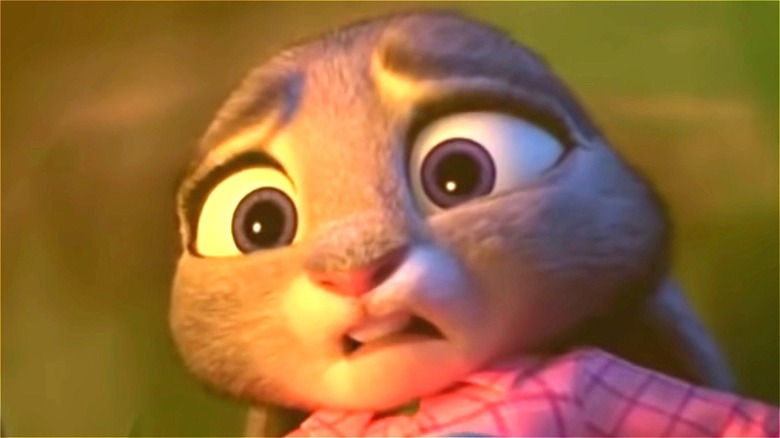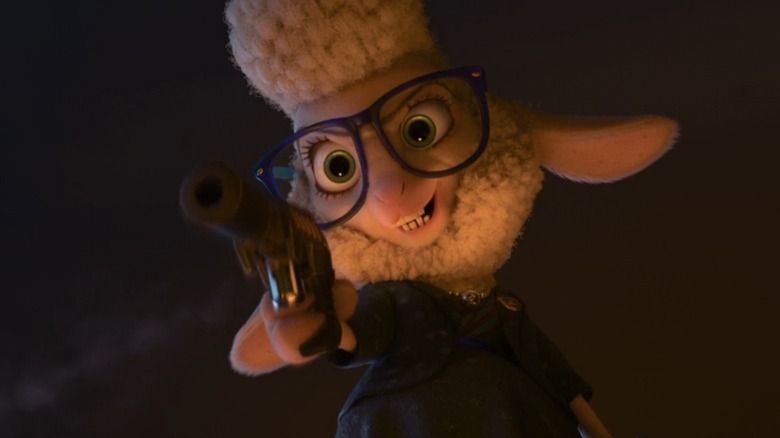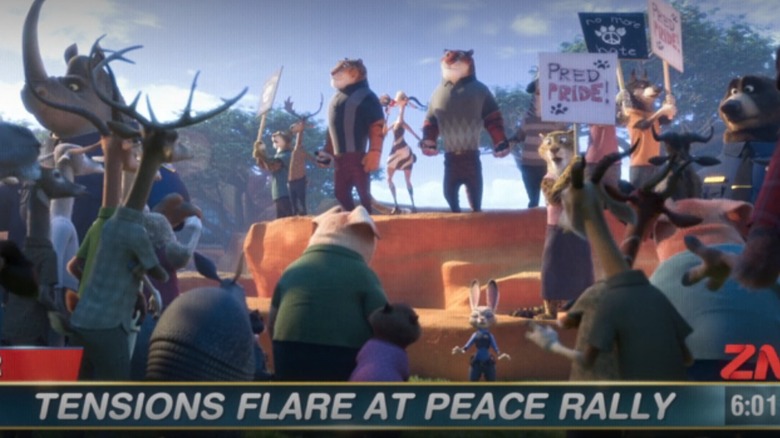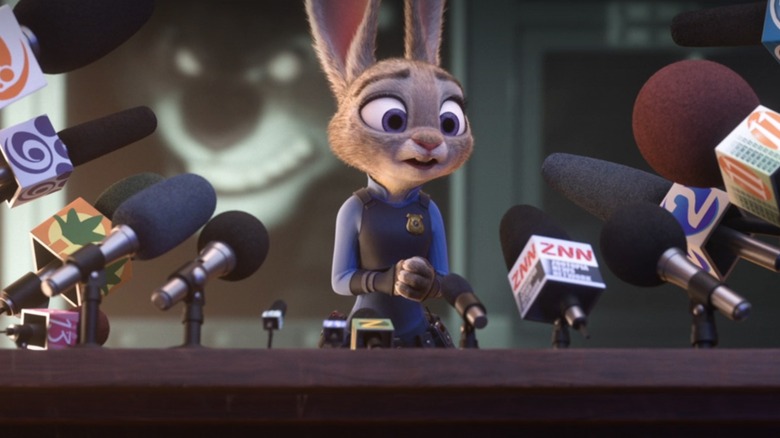The Ending Of Zootopia Explained
In 2022, we're headed back to Zootopia, the sprawling metropolis populated by talking mammals — from tiny, but vicious, shrews to naked, yoga-practicing yaks. That's because the Academy Award winning animated movie "Zootopia" is getting a spin-off series on Disney+, so this year is the perfect time to finally do a rewatch, and to revisit just what made this movie so lovable to kids and adults alike.
It all begins with a comedic noir tale set in the endlessly interesting Zootopia, where the consistently underestimated bunny cop Judy Hopps (Ginnifer Goodwin) teams up with the fox con artist Nick Wilde (Jason Bateman) to find a missing otter. The case is far from straightforward, entangling them with the Tundratown mafia, before nearly getting them killed at the hands of a feral jaguar in the Rainforest District. Of course, finding the missing mammals only leads to more questions: They're all feral and kept in a lab, where Mayor Lionheart (J.K. Simmons) is hiding them and trying to understand why these predators have gone savage.
The city of Zootopia soon succumbs to fear, with animals afraid of their neighbors, but then Judy gets an unexpected break in the case. The action-packed third act reveals the conspiracy at the heart of the mystery and the key themes at work in what, in the end, proves to be more than just a typical Disney movie about talking animals.
Bellwether drugged the predators, then Mayor Lionheart kidnapped them
Although Mayor Lionheart was covering up the strange pattern of predators turning savage, the animal behind it all is actually his seemingly innocent assistant: the little sheep Bellwether (Jenny Slate). It all comes together once Judy discovers that "night howlers" — their main clue from earlier — is not referencing the wolves guarding Lionheart's lab, but is actually a name for a type of plant. If ingested, night howlers can make any mammal — predator or prey — turn into a teeth first, no questions kind of animal. Crucially, it's the same plant that Duke Weaselton (Alan Tudyk) stole on Judy's first day as a cop, which leads her to unravel how it was being used on the missing predators.
She and Nick discover that Bellwether orchestrated a nefarious plan: She enlisted a few rams to go full "Breaking Bad" and develop a drug from the night howlers, then covertly sniped various predators with it, turning them feral. She wanted to make the city's prey population believe predators were reverting to their carnivore ways, because she's got a chip on her shoulder about being small and overlooked.
"Our villain is using fear to stoke division," director Byron Howard told Variety. He pointed out the third act taps into real world concerns about governing with fear, showing its harmful effects in scenes that hit close to home: At a peace rally, a pig shouts at a cheetah to go back to the forest.
In the end, though, Nick and Judy outsmart Bellwether by swapping the night howler darts with blueberries. Then Nick pretends to be feral, Judy reenacts her death scene from the opening school play, and they record Bellwether's villain monologue on Judy's carrot pen — exposing her plot to the public.
Zootopia's theme of bias takes many shapes
At the center of "Zootopia" is the theme of discrimination and prejudice, but there's no perfect one-to-one comparison to our own world. As Zootopia's first bunny cop, Judy faces bias reminiscent of sexism: Chief Bogo (Idris Elba) makes assumptions about her capabilities based on her small size, relegating her to the job of a traffic cop despite her demonstrated skills at the academy. Meanwhile, the predator and prey dynamic speaks of racism, with the majority group scared of a minority that are stereotyped for being violent. It's a good exploration of the themes, as long as you don't try to make it perfectly fit our social dynamics or question what predators eat now, if they don't hunt prey.
The idea for the movie was rooted in animal dynamics first: On a research trip to Africa, director Byron Howard watched lions drink water side by side with gazelles and zebras. He thought it was an "interesting social dynamic," and likened it to human cities, where different groups of people clash over ideas, but still work together for the basics of survival. That's where the premise came from, he told Slashfilm: "Even though these animals [in 'Zootopia'] have evolved and created this incredible civilization, what if they still held on to some of those sublimated fears and mistrust that have been around for thousands of years?"
For the film, the creators consulted an expert on bias and discrimination, Dr. Shakti Butler, who told them that subtle biases can be the most harmful. Making the movie tackle "subtle bias and the dangers that it presents for people who think that bias is a thing of the past," felt relevant to our own world, Howard told Zootopia News Network.
Judy faces her own prejudice
The core of the story is Judy's journey from naiveté to realizing the widespread prejudice against predators isn't a thing of the past, and exists within herself. After Judy and Nick recover all the missing mammals, she asks him to be her partner, giving him the carrot pen-slash-recorder she'd used as leverage to make him work on the case. It's a sweet moment, but quickly turns sour when Judy says during the press conference that the predators' evolutionary history is making them turn savage. In that moment, Nick is faced with the same prejudice he's been living with all his life, only it's now coming from his friend. She's been carrying fox repellent this whole time, but her words prove that she still harbors bias against him.
"We wanted Judy to see how discrimination was occurring and then fall prey to it herself," one of the film's directors, Rich Moore, told Creative Screenwriting. After her quick judgment at the press conference, the city becomes increasingly hostile against predators, making Judy realize her mistake is hurting mammals.
"Judy Hopps is this wonderful, good-hearted character, director Byron Howard told Slashfilm. "She wants to help people but she has a flaw that she doesn't realize ... It's a maturity story, she gets to grow in the story — she sees stuff in herself that she didn't realize was there before."
Judy's key moment of growth comes when she acknowledges her ignorance and apologizes to Nick. The end of "Zootopia" doesn't try to pretend that exposing Bellwether's plot fixed everything, but it's hopeful: "We all make mistakes," Judy says at Nick's graduation. "No matter what type of animal you are ... try to make the world a better place. Look inside yourself and recognize that change starts with you."



